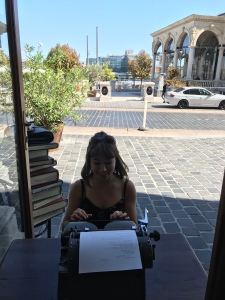I’ll admit I was a little confused when I closed ‘Fahrenheit 451’ for the last time and reflected on its story. I found its plotline relatively simplistic, so was struck with the idea that contemplation on the issues raised by Bradbury was crucial, possibly the most important purpose of the book.
Without question I was impressed. Bradbury’s use of language is innovative and captivating, and his wild, vivid imagery breath-taking. Original, off-beat metaphors and creative descriptions were a defining and brilliant feature of this short novel.
But as soon as I was introduced to the dystopian world in which ‘fireman’ Guy Montag lives, where fires are now started instead of fought by guys like Guy, I felt I knew where Bradbury was going. From the very beginning we see a society which values superficial pleasures over (arguably) civilisation’s greatest treasure: books.
This story is a warning; Bradbury is threatening us with an awful picture of the future, cautioning against the development of an intellectually hollow society.
And yet, Bradbury established this world at the very opening. His purpose certainly wasn’t to track such a descent – instead he shows us the picture of life after it. So what is he trying to do? I asked. The knowledge that this society was flawed is instinctive, certainly to any reader, so why show us Montag’s journey towards this realisation?
One answer came upon me as soon as I begun to search for it. Of course there will be others; we can’t know for sure what conclusion Bradbury intended us to reach. But maybe he’s trying to show us that this knowledge might not always be instinctive. Maybe that instinct will be diluted through generations who develop increasingly appealing technologies and pastimes which slowly reduce society’s appreciation for literature. Maybe, just as Montag journeys to discover what we feel to be a given, our voyage will be in the opposite direction.
With this in mind my favourite quote resonated beautifully, as Bradbury’s message to posterity:
‘The magic is only in what books say, how they stitched the patches of the universe together into one garment for us.’
News titbit: I won a Special Commendation for this review in the Portico Sadie Massey Award for Young Readers.

As always an interesting read Jess.
Glad you’re expanding your horizons into authors that wouldn’t necessarily be considered within “your genre”.
I enjoyed Fahrenheit 451 when I was around your age too!
Check out John Whyndam as another interesting author from that era. Some of his less-well-known books (Midwich Cuckoos, Kraken Wakes, Chocky and The Trouble With Lichen) are interesting reads.
There’s a whole slew of post-war British authors that are currently overlooked.
LikeLiked by 1 person
Thank you! Yeah, it’s quite different from 19th century stuff and I found that I enjoyed/appreciated it in a different way, and for different reasons. Thanks for the recommendation – I read The Chrysalids a few years ago and really enjoyed that, so I’ll definitely be adding those to the reading list! 🙂
LikeLike